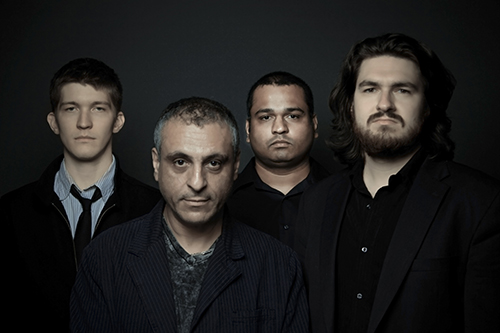| « Preview: Dan Deacon (older, wiser, but just as sassy) @ Lincoln Hall 11/7 | Review/Photos: Sharon Van Etten @ Cabaret Metro 11/07/12 » |
Interview Thu Nov 08 2012
Interview: Mehran Jalili Finds a Rock Band for the Flamenco Guitar
Chicago-based flamenco guitarist Mehran Jalili has literally followed the guitar around the world. Born in Iran, he moved to Chicago as a teenager, where he picked up the guitar after falling in love with the music of Led Zeppelin and Pink Floyd. He played in his own bands for a while, but ultimately decided to pursue a career in law -- that is, until he saw someone playing flamenco guitar at a club one night.

Jalili decided to scrap his law school plans and travel to Spain to study flamenco, which is a notoriously virtuosic style of guitar playing. In 2010, he released his first album, Angels of Persepolis, which garnered international attention for the inspiration it took from Iran's Green Movement protests. This year, Jalili released his second album, Subterranea, which finds him returning to his progressive rock roots as a flamenco guitarist. Jalili enlisted a group of three other Chicago musicians to help refine the flamenco style for the traditional rock band format.
I recently spoke with Jalili over the phone about his decision to bring flamenco into the genre he grew up listening to, the technical (and sometimes physical) difficulty of playing flamenco music, and the nature of having an international audience.
The Mehran Jalili Ensemble plays this Saturday at Uncommon Ground in Edgewater.
You grew up listening to progressive rock, and I imagine some of your early education on the guitar was heavily influenced by that music. What inspired you to return to the genre as a flamenco guitarist?
I was playing guitar when I was younger, in rock bands, heavy metal bands. But eventually I found myself on my way to Spain to study flamenco guitar, and I was studying primarily only flamenco music. I didn't touch the electric guitar for many years. I did my first CD, Angels of Persepolis, and as usual, when you release a CD to a flamenco audience, it's all about the chops and the technical abilities. I got all of that out of my system with that CD, and I wanted to do something different next. I didn't want to do the same CD. As much as I love flamenco, I have a burning desire to play rock music all the time-or to listen to it at least. So I thought, why don't I use flamenco technique and use a flamenco guitar but put a band together that plays progressive rock? And Subterranea is the result of that.
Was that hard to do, to mix those two genres?
It was very natural to me. The music I was writing and the melodies I had all came very easily. It wasn't as complicated as my first CD. For that one, I didn't put a band together, I just brought in a lot of studio musicians for all kinds of instruments instead. And this time I said, "No, I want to have the same format as any old '70s psychedelic rock band." The keyboard was very essential to the sound this time. It all came very easily. It took me about four months to record--and I actually had hand surgery during that time.
Hand surgery?
I had to play piece called "Moonlight Sonata" for about six months every day from beginning to end, and it has all these stretched out chords. It was originally created for piano, so it's very unnatural on a guitar. I was doing a lot of practicing, and when I started recording for Subterranea, I started to feel numbness in my hands, and I knew immediately it was carpal tunnel. It set me back about a month. But that's what you have to go through (as a flamenco guitarist). I've had the same surgery on my other hand. It's not a big deal, it just takes a few weeks.
What are some of the most memorable prog-rock albums from growing up?
I've been a loyal follower of Jimmy page. He is the reason I started playing guitar. I saw him when I was 14, and I said, "I want be him". And that has basically been my goal, not to "be him", but to be a prominent, good guitarist respected by not just common people but by my colleagues and other guitarists. But definitely Led Zeppelin, Pink Floyd, The Eagles. (Pink Floyd's) The Wall had a big impact on me and my learning to play, also Dark Side of the Moon, and Led Zeppelin I through IV.
You've described the concept for your latest album Subterranea as "a constructive social criticism and an objection to the way humans today treat each other". Can you talk a little bit more about that concept and it unfolds in the album? How are these songs related?
It's a reference to our recent electronic world. Everything has become so fast and so quick, and I just feel like everything around us has to do with consumerism. Our society has certainly changed. We have to work all the time, and looking at our economic situation-and I'm talking globally, not just here in the U.S.-it's a lot worse off for a lot of people. And I noticed that it has changed our behavior and the way we treat each other-not even just person-to-person. For example, if something really bad has happened on the news, in order to heard about it, first I have to sit through 30 seconds or a whole minute of commercials, and it just seems like greed and consumerism has taken over our character as human beings. So I took that concept and I wanted to give it a face. I created an imaginary civilization under the earth that acts very differently from how we do now. They are supposed to be what were supposed to be. Their whole being is based on love and transcendence and longevity. And we are not. It's basically a sarcastic way of letting us know what we are now is not what we're supposed to be.
Tell me more about the band you enlisted for these new songs. Was it hard working with a "rock band" after so many years studying flamenco?
Well, what we're doing is different still from any old rock band, even though it has a lot of rock characteristics between the melodies and the heavy backbeat. But flamenco is a very difficult kind of music as far as for the guitar. I've studied a lot of different genres, and flamenco is the hardest of all of them. But at same time, you have so much freedom to do so many different interpretations. It was all pretty natural to me because I had this rock and roll background. I actually think flamenco itself is harder. My first CD was more difficult to create than this.
I write all of the stuff but when I put these guys together, they give the music an orchestration that goes beyond my imagination. They have a lot do with this music.
What goes into blending styles in the way that you do? Is it something you discover naturally or is there some more deliberate thought in trying to blend two distinct sounds?
I practice a lot, so I keep playing and playing until I come up with something that gets my attention. The next day, I get back to guitar and see if my remember anything from yesterday that stood in my mind. If I remember it, then that's likely because it was catchy enough, so I work with it. I start working on that riff and developing something out of it. Sometimes you have to spend time and think. It take sometimes 3 month to write a song. It's still rock and roll but it's pretty complicated. There so many diff parts and orchestration.
Subterranea seems to be quite a different endeavor from Angels of Persepolis. What's next for you?
Subterranea is being reviewed by so many places right now, we're hoping to get some sort of record deal or signing. Especially in Europe, we've received a number of good reviews there.
Were you surprised to see that?
I was surprised to see more reviews in the U.K. and Belgium. For some reason, a lot of Belgian sites are writing about it.
How does the audience for flamenco music in the U.S. and Chicago compare to that in Europe?
It's been a learning experience for me. I was drawing toward a more flamenco audience with Angels of Persepolis. If you're in Spain, there is a lot of flamenco music and they judge the techniques on everything you do. It's a lot looser here in the U.S. because the interest in this kind of music is very limited. So that is one of the reasons why I try to make this migration into mixtures of flamenco and rock and jazz, just because personally, I like it, I enjoy doing it. And it gets more attention here in the U.S.
The Mehran Jalili Ensemble performs this Saturday at Uncommon Ground on 1401 W. Devon Ave. Music begins at 10pm. $15 at the door. The show is open to all ages. Watch the video for "Into the Abyss", a track off Subterranea below:
The band also performs at Martyr's on Saturday, November 24, at 7pm. Tickets are $15. Martyr's is located at 3855 N. Lincoln Ave. The show is 21+.















